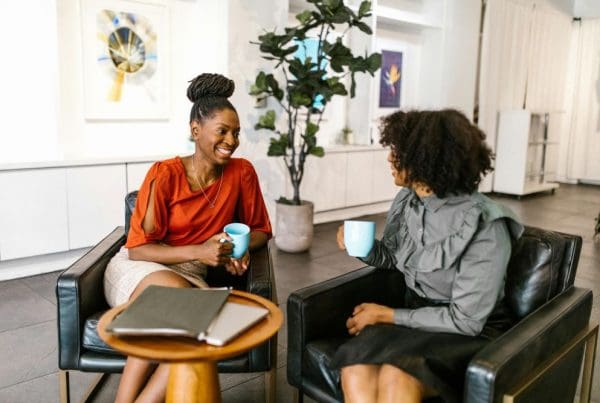The provision of quality behavioral health care, be it psychiatry, therapy, counseling, or otherwise, has with it a level of personal involvement that is seldom rivaled by other industries. At Valant, we’re no stranger to the importance of the work providers do to improve the lives of society’s most vulnerable individuals, which is why we wanted to take a moment to recognize Lynece Benton-Stewart, Valant’s 2017 Behavioral Health Provider of the Year.
We had the opportunity to interview Lynece recently and learn more of her experience, which can be read below.
VALANT: Tell me about Benton Counseling. I saw that you provide a wide array of services but I would love to know…just give us a rundown of the services you provide and what Benton Counseling is like, what it’s about.
Lynece Benton-Stewart: Benton Counseling started as pro bono services because I worked in community mental health for a while, but I was not able to do the counseling aspect. I got in the field originally for counseling because that’s what I really wanted to do. So, I started doing some pro bono services in partnership with the Salvation Army in one of their family resource centers. I was doing free services for families and individuals for a couple of years until the Nashville flood in 2010, when the Salvation Army had to use all of their space to provide emergency services to the families.
In 2011 I resigned my full-time position and started providing services in contracts with a managed care company while still doing some of the pro bono services in the same area. I just kind of moved down the street into my own private office. I work with a lot of family units, I do individual counseling, I do couples counseling, and I just continued to do some of the same work that I’ve been doing over the years. I’ve worked with youth for years, I’ve worked with adults for years, and I’ve been in community mental health for over 17 years.
VALANT: Why did you get started doing therapy?
LBS: It’s always been my passion to just work with individuals and help individuals. I started working in child care after high school, and we’ve worked with a lot of youth with challenges, some of which they would always send to my classes. I had the patience and tolerance and so I would just be creative.
I would go home and the next day I would come back with a new way of working with certain individuals. That’s when I had the idea that when I graduated college I was going to have a specialized day care that worked with only behavior challenged youths. That was my passion, so after I graduated from college, I started working with adults. I ended up being at the same agency for 16 years until I went into private practice. I was promoted over five times, which pulled me far away from doing the individual work, and that is why I went to school in the first place.
Although I worked with adults and loved every bit of it, getting promoted up to an Associate Director position meant that I was losing my ability to do the work I really wanted. I was supervising directors who did their own clinical supervision. So I resigned and came back to doing my own private practice, where I am able to do counseling.
VALANT: What is it about your work that inspires you and propels you forward every day and just in your career?
LBS: The hope. Seeing individuals get back to who they are, and giving them the tools to be able to manage their lives the way that they used to. Just seeing that is what inspires me. Seeing people making emotional connections and interactions on their own where they couldn’t before. Getting a phone call to just cancel a couple’s session not because they don’t want to come in, but because they say, “Hey, we’re having a date night tonight.” I’m like, “A date night!” My eyebrows are going up and I think, “That would have never happened before.” That’s what keeps me going.
VALANT: How do you find new ways to communicate with your clients and how do you find what works best?
LBS: Well, I don’t think it’s necessarily always new ways of communicating; I think it’s just the practice and the skills that we were taught in the counseling field. I meet with clients and I listen and try to pick up on clues for defensiveness or look for signs of personality disorders or try to reflect and validate who they are, to make sure that I am aligned with them. I want to make sure that I’m aligned with the individual before I try to do anything with them because I don’t want to say or do the wrong thing. Of course, I’m soft, I’m slow, I’m not fast, and I just try to listen and try to be with the individual. At the end of the session I try to process what I could have done differently, what I could have done better, and I’m always trying to process the session to make sure I’ve done my due diligence.
VALANT: What are some challenges you face on a day-to-day basis being a provider?
LBS: When opening my practice, I wanted to make sure I was able to serve the community that had limited resources. The community that I manage is changing; They are building all around, so some of the individuals are having to move further out or can’t stay in the same homes that they’re in currently. When I first moved over here I wanted to be able to make a difference in the community. I wanted to be able to provide affordable counseling, alternative counseling services to the individuals that were here.
So a lot of the individuals when they do go to counseling, they go to the community mental health agencies and there’s nothing wrong with that whatsoever but I wanted them to be able to have an alternative source if they would like to have that and also make it affordable to them. So now, with everything going on in the community, they’re moving further out and I’m not accessible to them so that’s a challenge right now and the other thing is just kind of being able to help people understand that at times if you don’t have any money, don’t cancel your appointment, just call and communicate with me. I’m still here. We’ll work something out. I try to provide a financial stipend or something like that to where the services are still affordable because some people don’t come to their appointments because they feel like they can’t afford it this week or they can’t afford it the next week so I try to keep that communication open with some of the individuals that…do not cancel your appointment because you can’t afford it, let’s talk.
VALANT: What was your best day at work, when you felt the most gratification or affirmation for what you do?
LBS: There’s a family that I’ve been working with and it’s three generations: a granddaughter, mother, and grandmother. I always try to hold the hope for a family, but when this family first came in, I didn’t know if they’d come back. There were a lot of raised voices and a lot of “never” words being used. The best day was when I heard the daughter talking about her mother, “Guess what happened this weekend?” She said, “I got a hug from my mom.” This was something the daughter wanted more of. It’s not as if it never happened, but the perception was that it never did.
I didn’t want to push anything and I don’t push anything; we worked at a slow pace. “We went out to lunch together and we had a talk and we talked about all these things, and we had a momma-daughter date,” she said, and I’m sitting there thinking, “What?” But that wasn’t the end of it. The other thing was the mother and the grandmother had a mani-pedi and I was like, “They haven’t communicated in over a year and they went and had a mani-pedi together” and I was like, “Well, you know what, if that can happen with that family, then there is hope that it can happen with some others.”
We hope you enjoyed our conversation with Lynece. Though her story is just one example of the great work that gets done in the behavioral health industry every day, we hope it has provided for you a similar degree of inspiration that it has for us.



